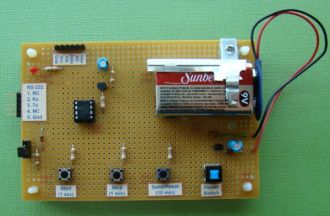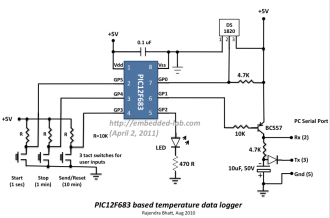
We strongly encourage users to use Package manager for sharing their code on Libstock website, because it boosts your efficiency and leaves the end user with no room for error. [more info]

Rating:
Author: Rajendra Bhatt
Last Updated: 2016-02-21
Package Version: 1.0.0.0
Category: Measurement
Downloaded: 2606 times
Followed by: 3 users
License: MIT license
It is a very simple data logger project based on PIC12F683 microcontroller. The microcontroller reads temperature values from a temperature sensor on a regular interval basis and stores them into its internal EEPROM memory.
http://embedded-lab.com/blog/?p=2236
Do you want to subscribe in order to receive notifications regarding "Single chip (PIC12F683) temperature data logger" changes.
Do you want to unsubscribe in order to stop receiving notifications regarding "Single chip (PIC12F683) temperature data logger" changes.
Do you want to report abuse regarding "Single chip (PIC12F683) temperature data logger".
| DOWNLOAD LINK | RELATED COMPILER | CONTAINS |
|---|---|---|
| 1313695658_single_chip__pic.zip [329.76KB] | mikroC PRO for PIC |
|
It is a very simple data logger project based on PIC12F683 microcontroller. The microcontroller reads temperature values from a temperature sensor on a regular interval basis and stores them into its internal EEPROM memory. The recorded temperatures can be later transferred to a PC through serial interface. The sensor used in this project is DS18B20. It is a digital temperature sensor manufactured by Dallas Semiconductor (now MAXIM) that can measure temperature ranging from -55°C to +125°C with an accuracy of ±0.5°C over the range of -10°C to +85°C. Each temperature reading is stored as a byte into the internal EEPROM of PIC12F683, which means only the eight most significant bits of DS18B20 output is recorded.

The data logger is powered from a 9V battery using a LM7805 regulator IC. The three tact switches allows user to set the sampling interval.
View full image
The circuit uses a single transistor based TTL to RS232 conversion circuit for transferring the recorded measurements to a PC through serial port.
View full image